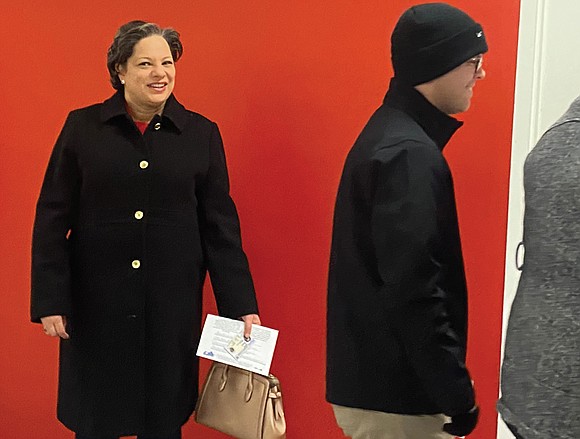Ready to serve
Jennifer McClellan defends rushed primary after landslide victory
Jeremy M. Lazarus | 12/29/2022, 6 p.m.

Richmond state Sen. Jennifer L. McClellan is on the fast track to Washington.
Sen. McClellan received an early 50th birthday present in winning a smashing victory in the Dec. 20 Democratic “firehouse” primary in taking her first step to succeed the late A. Donald McEachin as the 4th Congressional District representative.
The 17-year General Assembly veteran, who turned 50 on Wednesday, now only must best a lightly regarded Republican, Leon Benjamin, in the special election set for Tuesday, Feb. 21, to fulfill her quest to become Virginia’s first Black congresswoman.
Mr. Benjamin, a minister, lost twice to Congressman McEachin, most recently in the Nov. 8 election that took place three weeks before Congressman McEachin’s death.
For Sen. McClellan, a victory would mean she would give up her post as the senior senator for Richmond and end her role as a member of Verizon’s legal team to become a freshman in Congress. She said she decided to do so to have an opportunity “to serve more people.”
The only potential roadblock could be a federal lawsuit that seven people have filed challenging the constitutionality of the informal primary that the state Democratic Party held to select its nominee for the now vacant seat.
The hand-counted primary results that were released after the Free Press publication deadline last week show that Sen. McClellan received 23,661 votes, or about 85 percent of the 27,900 votes cast to outdistance her three male rivals, according to the state party.
Her closest rival, Petersburg state Sen. Joseph D. Morrissey received just 3,782 votes, or 13.6 percent, while former Peters- burg Delegate and attorney Joseph E. Preston and businessman Tavorise K. Marks receive a combined total of 391 votes, the party reported. Another 66 people submitted blank ballots.
Mr. Marks is one of the seven plaintiffs that in the lawsuit political strategist Paul Goldman, a former chair of the state Democratic Party, initiated to challenge the legality of the primary.
The other plaintiffs involved in suing Gov. Glenn A. Youngkin, the state Board of Elections and the party include Tamia
Douglas, Tina McCray, Jamale Pope, Julie Pope and Richard Walker. A hearing has yet to be set in the case.
At a post-primary press conference just a few hours after winning, Sen. McClellan defended the rushed process, saying that the party had to move quickly based on Gov. Youngkin’s decision to set the special election for Feb. 21, leaving parties with just 11 days to nominate their candidate.
“Everyone who wanted to vote could vote,” Sen. McClellan, a staunch voting rights defender, insisted.
She and state Democratic Party Chairwoman Susan Swecker noted that turnout Dec. 20 was nearly double the 15,600 people who voted in a 2016 state-run primary in the 4th Congressional District that Congressman McEachin won. However, they did not mention the 57,000 people who voted in a 2020 state-run Democratic primary in the district that Congressman McEachin also won.
According to the suit, Sen. McClellan’s claim that everyone had a chance to vote does not pass muster.
The suit that Richmond-based attorney Elliott B. Bender filed on behalf of the plaintiffs alleges that the party violated the federal constitution by making it impossible for active-duty military
personnel to participate, and creating significant burdens on the voting rights of elderly people, women with childcare and work responsibilities and individuals without transportation.
The suit alleges the party violated the 1st and 14th amendments of the U.S. Constitution and the Voting Rights Act by limiting voting to eight polling places in a congressional district that stretches from the Richmond area to Southampton County on the North Carolina border.
According to the suit, eight of the 15 localities did not have a polling place, creating an unconstitutional burden on residents of those localities who were forced to travel a considerable distance to cast a ballot.
A state-run primary would have provided 200 polling places, the suit notes. While the state has granted discretion to the party to select its nominee, the suit said the grant of authority does not permit the party to hold primaries that violate the law and past court precedents.
The suit requests the court order a do-over that would meet constitutional standards or fashion a remedy that would prevent such primaries in the future.






